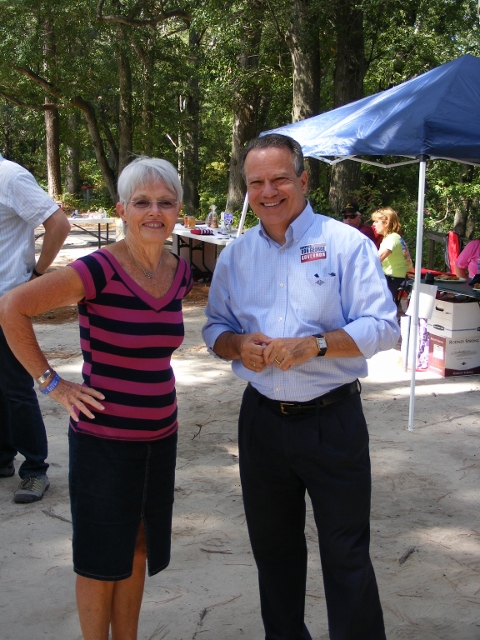In the First Congressional District, winning the Republican primary is tantamount to winning the race: the latest round of gerrymandering by Maryland Democrats made sure it would be by creating an R+13 district in a state that’s nominally D+26. So what do I make of an announcement by upstart former Delegate Michael Smigiel that he has a 2-to-1 lead over incumbent Andy Harris in a pre-primary poll?
If you read between the lines, you’ll see a few interesting tidbits. And my readers may recall that my co-writer Cathy Keim talked about a survey she took a few days ago. Chances are this was the same Gravis Marketing survey Smigiel is referring to in his work, which leads me to believe this was a push poll Smigiel did to build up his support. If you’re a relative unknown in much of the district, a tactic often used is that of driving up the negatives of the established politician.
Ironically, it’s much the same tactic Harris used to win the nomination in 2008 against a well-known incumbent, Wayne Gilchrest. Wayne’s biggest issue was the leftward drift of his philosophy and voting record, so much so that a clearly upset Gilchrest later rejected his party’s nominee and endorsed the Democrat challenger, Frank Kratovil. That and the Obama wave election led to Kratovil being a one-term Congressman before Harris defeated him in the TEA Party wave election of 2010.
As Cathy described it – a manner which isn’t reflected in Smigiel’s narrative – the issue questions came first:
Calls were made to over 20,000 voters with over 600 individuals answering the poll, and results indicate that when voters were informed that Rep. Harris had voted to fully fund Obamacare, 82 percent (82%) of the Republican primary voters surveyed would not vote for Harris.
When voters were aware that Rep. Harris had voted to fully fund President Barrack (sic) Obama’s unconstitutional use of executive power to grant amnesty to millions of illegal aliens, 85 percent (85%) of Republican voters said they would not vote to re-elect Harris.
Likewise, 80 percent (80%) of those surveyed reported that they would not vote to re-elect Rep. Andy Harris if they knew he had made the statement that it was “just fine” for Planned Parenthood to sell baby parts as long as they did not use federal money to do so.
Nationally, Rep. Harris is known as the most outspoken critic of D.C. and states which have chosen to allow medical marijuana, decriminalization or legalization. In the 1st District, fifty-nine percent (59%) of the Republican voters surveyed reported they would be less likely to vote for Harris because of his anti-marijuana, anti-state’s rights stance.
In that context, it’s hard to believe Harris got 29% when over 80% of Republicans disagreed with him on one or more issues.
But there are two advantages Andy still enjoys in this race. While the FEC data is still from back in September, Harris had over a half-million dollars in cash on hand while Smigiel barely registered. Certainly Harris has been fundraising since then, and incumbents often enjoy the largest share of PAC money. In the 2015-16 cycle Harris had already amassed over $166,000 from various committees, a large portion of them in the medical field.
The second advantage is the IOUs Andy has built up through donating to local candidates. Here’s just a few that I noticed on his 2013-14 FEC report:
- Bob Cassilly (Senator, Harford County) – $4,000
- Matt Morgan (Delegate, St. Mary’s County) – $1,000
- Theresa Reilly (Delegate, Harford County) – $1,000
- Mike McDermott (former Delegate, Worcester County) – $4,000
- Bob Culver (Wicomico County Executive) – $4,000
- Carl Anderton (Delegate, Wicomico County) – $4,000
- Christopher Adams (Delegate, Wicomico County) – $1,000
- Jay Jacobs (Delegate, Kent County) – $1,000
- Jeff Ghrist (Delegate, Caroline County) – $1,000
- John Cluster (Delegate, Baltimore County) – $1,000
- Johnny Mautz (Delegate, Talbot County) – $1,000
- Justin Ready (Delegate and now Senator, Carroll County) – $4,000
- Kathy Szeliga (Delegate, Baltimore County) – $4,000
- Kevin Hornberger (Delegate, Cecil County) – $4,000
- Mary Beth Carozza (Delegate, Worcester County) – $4,000
- Nic Kipke (Delegate, Anne Arundel County) – $4,000
- Rick Impallaria (Delegate, Baltimore County) – $2,000
- Robin Grammer (Delegate, Baltimore County) – $1,000
- Steve Arentz (Delegate, Queen Anne’s County) – $1,000
- Susan Krebs (Delegate, Carroll County) – $4,000
- Addie Eckardt (Senator, Dorchester County) – $1,000
- Michael Hough (Senator, Frederick County) – $4,000
- Herb McMillan (Delegate, Anne Arundel County) – $4,000
- Ric Metzgar (Delegate, Baltimore County) – $1,000
- Johnny Salling (Senator, Baltimore County) – $4,000
- Maryland Republican Party – $49,500
Well over $100,000 went from Andy’s campaign coffers to help build the GOP state bench with several new legislators being the result. I don’t look for a lot of those folks jumping ship to support (in several but not all cases) a more recent former colleague. That’s a significant part of the state GOP delegation, including all three who defeated Smigiel in the 2014 Republican primary. And electability is a legitimate question mark for Smigiel.
In the 2014 Republican primary, Smigiel was fourth among seven candidates, four of whom hailed from Smigiel’s Cecil County portion of the district – those four finished fourth through seventh. (Mike finished third in Cecil behind fellow resident Alan McCarthy, who finished a distant fifth overall, and Jay Jacobs of Kent County, who was second overall.) Smigiel was third among five candidates in 2010 (all three winners were Republican) and while he kept the seat in 2006 based on the overall district vote he actually lost in his home Cecil County to Democrat Mark Guns. Smigiel was barely second out of five when he won his first term in 2002, so he’s never been overwhelmingly popular at the ballot box – just good enough to win three terms in a very safe GOP district. The fact that three other people challenged Smigiel from Cecil County – knowing only one of them could win due to an election law stating only one person could advance from any particular county – indicates there was some dissatisfaction with him, just as many are now displeased with Harris.
That anger toward Harris attracted Smigiel to the race and produced a poll result like this. Since he won the election in 2010, Harris has had little in the way of a challenge from either party until now. It’s a race perhaps reminiscent of the 2004 primary between Wayne Gilchrest and then-Maryland Senator Rich Colburn – the fact Colburn got 38% against a sitting Congressman may have opened the race up four years later when state officials could run from cover again without having to risk their own seats.
If I were to handicap the election today I would put it around that 60-40 range with Harris prevailing. A lot can occur in 3 1/2 months, though, and it’s probably good for Harris that there are a couple of other lesser known hopefuls in the race to split the protest vote.
This may be a good time to point out that Andy has a couple of townhall meetings slated for the Eastern Shore. On Monday night the 18th he will be at the Black Diamond Lodge in Fruitland for a 6 p.m. meeting. (Right next door is the site of Andy’s chicken suit affair of a few years back.) Then Tuesday at noon he will be the host at the Easton Volunteer Fire Department headquarters on Aurora Park Drive.
Unfortunately, I already have a commitment for Monday night so I will have to hear second-hand about what the Congressman has to say. It will be interesting to hear how all that goes down.












